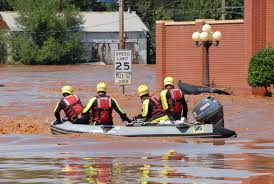Adaptation to climate change
Wildfires: Managing the Risks
How can we limit the spread of wildfires and save people and property?
Wildfires are already a serious problem, and climate change will only make the problem worse, as I’ve discussed in my two prior posts. Reducing carbon emissions can help keep the problem from growing, but we need to deal with the risks we’re already facing. That is going to require a portfolio of risk management strategies. We …
Continue reading “Wildfires: Managing the Risks”
CONTINUE READINGCenter for Ocean Solutions Releases Consensus Statement and Report on the Public Trust Doctrine, Sea Level Rise, and Coastal Land Use in California
Report Analyzes State Public Trust Responsibilities on the Coastline, Coincides With Coastal Commission Staff’s Release of Draft Residential Adaptation Policy Guidance
UPDATE (September 1, 2017): The statement’s drafters have provided a link (shared at the end of the post) for California attorneys who wish to sign on to the statement discussed here. Last month, a group of public trust and coastal land use experts, working under the auspices of the Center for Ocean Solutions, released two …
CONTINUE READINGLouisiana Flood Lessons for a Climate-Changed Future
Louisiana’s preparedness for a 1000-year flood, and implications of the slow media response for slow-onset climate impacts
The devastating floods in southern Louisiana a week ago left at least 13 people dead, tens of thousands in need of rescue, and 60,000 homes damaged. In one parish, nearly ninety percent of homes flooded. Cellular network failures, road closures, power outages, and sewage-contaminated floodwaters continue to threaten relief efforts. The American Red Cross is …
Continue reading “Louisiana Flood Lessons for a Climate-Changed Future”
CONTINUE READINGThe Future of Conservation
Earlier this year I wrote critically about a New York Times op-ed that proposed making the restrictions on development in wilderness areas more flexible in order to allow for adaptation to climate change. This week the Times published what I think is a much more helpful op-ed on the topic of how we should address …
Continue reading “The Future of Conservation”
CONTINUE READINGHighly Uncertain But Not in Doubt
It seems paradoxical to say that climate change is uncertain but not in doubt. At this point, we can be highly confident that greenhouse gases are disrupting the climate system and that the disruption will be very serious unless we act. But there’s considerable uncertainty about the magnitude of climate change and its local …
Continue reading “Highly Uncertain But Not in Doubt”
CONTINUE READINGCalifornia publishes new report on adapting to climate change impacts; is anyone paying attention?
All eyes are on the COP-15 proceedings in Copenhagen, and specifically on the prospects for greenhouse gas reductions emerging from the meeting. At the same time, we need to plan to adapt to some measure of climate change impacts, some of which are unavoidable regardless of our success at reducing GHG emissions, and to build …
CONTINUE READINGAdapting to Climate Change? Should the States or the Feds Take the Lead?
A great deal of attention has been devoted to federalism issues relating to climate change mitigation. In contrast, the federalism dimension of adaptation has only begun to receive attention. Regardless of mitigation efforts, however, it is clear that society will experience substantial climate impacts and that major adaptation efforts will be required. What roles should …
Continue reading “Adapting to Climate Change? Should the States or the Feds Take the Lead?”
CONTINUE READINGWow, things really have changed in Washington: a Cabinet official speaks about climate change’s impacts on California
The Los Angeles Times has a story today in its (venerable but soon-to-be-axed) California section discussing new Energy Secretary Steven Chu’s public statements on the dramatic challenges California will face as a result of climate change. From the story: Chu warned of water shortages plaguing the West and Upper Midwest and particularly dire consequences for California, …
CONTINUE READING




